Money Is a COW, and It’s Time for the COWs to Come Home
 On April 22-23, finance ministers from the G-20 countries will be meeting to tweak the international system of finance. They are planning to discuss how to regulate the financial industry and prevent future financial collapses. Perhaps they will make some progress, but they won’t get it right until they gain a better understanding of how money works. The G-20 ministers would do well to invite the authors of the following two quotes:
On April 22-23, finance ministers from the G-20 countries will be meeting to tweak the international system of finance. They are planning to discuss how to regulate the financial industry and prevent future financial collapses. Perhaps they will make some progress, but they won’t get it right until they gain a better understanding of how money works. The G-20 ministers would do well to invite the authors of the following two quotes:
1. We know that unlimited growth in a finite world may eventually lead to ecosystem collapse, but the framework of our modern economic system depends upon the assumption of exactly that – unlimited growth.
2. The inevitability of our planet’s ecological limits means that the choices before companies are not about whether they care for the environment, but about the substance and relevance of what they are doing. Dealing with limited ecological capacity is arguably the most important business challenge facing companies in the 21st century.
These aren’t the quotes of a renegade economist, exiled from a neoliberal university department, and they are not quotes from a starry-eyed activist railing against “the man.” These quotes actually appear in the introductory material of shareholder reports for a global mutual fund. Leslie Christian and Carsten Henningsen, co-founders of Portfolio 21, are the authors.
The fact that mutual fund managers wrote these quotes is quite fascinating. It seems almost paradoxical, since their job is to generate returns for customers. No mutual fund can long survive if the companies in the fund’s portfolio aren’t growing (or at least expected to grow). Christian and Henningsen accept the ultimate truth that unending growth is a myth, and they are not afraid to level with their clients and recognize that Portfolio 21 will change over time.
If the G-20 ministers want to reform the complex and failing financial system at the national and global scale to make it more dependable and more consistent with long-term ecological health, they will need advice from keen thinkers like Christian and Henningsen. What is it about money that the finance ministers need to understand? They, like the majority of citizens, are operating from an incomplete mental model of how money works. Most of us already understand that it’s good to have some money in our pockets. Money gives us access to necessities and comforts. If we have it, we can get the things we need and want for ourselves and our families. That’s quite an incentive for us to make sure we have enough money, and even an incentive to make sure we have more than enough. Most of us also understand that money translates into power. The more of it we have, the more influence we can wield on the world around us. Taken to the extreme, a large corporation or government with truckloads of money can remove entire mountains, launch spacecraft, or deploy an army. Those are well understood characteristics of money, but there is one simple and critical feature of money – a feature with wide-ranging implications – that we have largely forgotten.
Money is not real wealth, but rather a claim on wealth or COW. Real wealth takes the form of housing, land with good soil, medical care, dinner, computers — actual goods and services that provide value. Money itself has no authentic value, except that we accept it as a COW. Money is akin to a concert ticket. The only reason anyone wants a ticket is to gain access to the concert. Just as the ticket is redeemable for a concert-going experience, money is redeemable for real wealth. Having hundreds or millions or billions of concert tickets is only valuable if you can attend hundreds or millions or billions of concerts. The same concept applies to money. The only reason anyone wants a wad of money is to be able to exchange it for a bundle of goods and services.
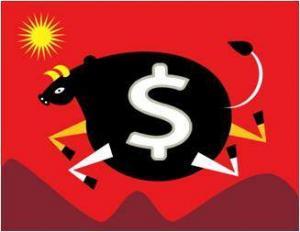
How large can our COWs grow?
This feature of money doesn’t pose a problem unless we have unrealistic expectations for money (COWs). Unfortunately it appears that we have indeed strayed from reality — we expect money to grow exponentially through the magic of compounding interest. When people and institutions make investments (e.g., an employee investing in a pension fund, a bank providing a home mortgage loan, or a mutual fund manager buying corporate stocks), they anticipate a return on their investments. They assume that they will recoup their investment plus interest, subject to some amount of risk. We have also come to expect additional returns when we re-invest our original earnings. It has become altogether commonplace – part of the institutional framework of money — to assume compounding interest and exponential growth. Our COWs are not subject to any physical or ecological laws. Money in a bank account can increase as high as we can count, but what about the stuff it can buy? Can we exponentially increase the amount of stuff we produce and consume? How long can real wealth, which is certainly subject to the laws of physics and ecology, continue to increase the way our COWs do?
There are two big and disconcerting implications of this disconnect between the way real wealth can grow and the way our COWs can grow. The first is that prices can be set by individuals or a collection of individuals in a market without considering ecological limits. Many economists over the years have claimed that we don’t need to worry about environmental problems as long as we get the prices right. They say the reason our roads are congested is that the price of driving is too cheap; the reason we are misallocating precious water resources is that the price of water is too low; the reason the housing market crashed is that price of houses was too high… Experience has shown, however, that both the market and government regulators all too often fail to get the prices right. If achieving ecological sustainability were a simple matter of getting the prices right, we would have done so years ago.
The second implication is that economists and politicians have become downright obsessed with growing real wealth to keep pace with the growth of our COWs. Doing so (by encouraging national economic growth rates of about 3% per year) prevents the financial system from collapsing (at least until we hit the limits on expansion of real wealth), ensures there are enough jobs to go around, and prevents us from tackling the tough task of distributing wealth. This last point about wealth distribution may be the key. If wealth is always increasing, then there’s no need to divide it up equitably – everyone can get a piece of the expanding pie. The problem is that the planet isn’t set up to provide an ever-expanding pie. Plenty of evidence suggests that even with our growth obsession, we can’t keep the growth going. We’re bumping up against profound limits. The litany of ecological breakdowns, from species extinctions to climate instability to desertification, is clearly confirmed in a mass of peer-reviewed research.

Cows in a factory farm (Public Domain)
There are no easy solutions to bridging the gulf between our stocks of real wealth and our exponentially growing COWs. The very first step is for citizens (especially the G-20 finance ministers) to appreciate the difference between wealth and COWs. Only then can we begin to institute real changes to our economic framework and financial system. If we are to make a paradigm shift — a shift from mindless pursuit of perpetual growth to an economy that persists within the physical and ecological bounds of the planet, a shift from wishful thinking to perceptive and reality-based decisions – we will need to fence in our COWs.
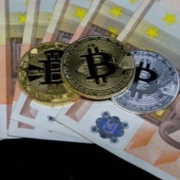
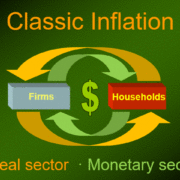
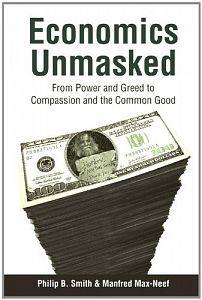
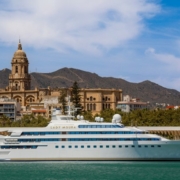
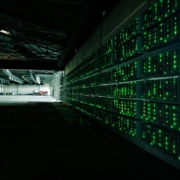
Wonderfully put.
For those who feel the urge to act, I’d reccomend:
Save up, hard, for 2 or 3 years, or cash in your assests
Buy a little land with friends and family (mortgage free)
Self build cheap housing (Yurts, self build, prefab etc)
Be rich third world style, instead of poor first world style
In New Zealand, you can join us doing the same thing at http://www.ecovillage.host56.com
A chest of gold coins or a fat wallet is of no use whatsoever to a wrecked sailor alone on a raft. He needs ‘real’ wealth, in the form of a fishing rod, a compass, an outboard motor with gas, and a female companion. – Alan Watts
Rob,
I love the last line, “If we are to make a paradigm shift — a shift from mindless pursuit of perpetual growth to an economy that persists within the physical and ecological bounds of the planet, a shift from wishful thinking to perceptive and reality-based decisions – we will need to fence in our COWs.” Well done!
It’s amazing how infiltrated the idea of returns on investment is in our world culture! We assume that any investment should be rewarded at the same value plus more. It is an odd conflict with morality, I think. “I’ll help you (with this stack of cash) but only with you help me back more (cash plus interest).” It is a subtle form of thievery performed by banks everyday that contributes to main injustices, principally a systemic need for economic expansion, as you pointed out.
I look forward to the future in a steady state economy, where we return favors in kind without demanding for more. We can create more people-based monetary systems; the documentary “The Money Fix” touches on some: http://bit.ly/4CPUgi
Cheers,
Joshua
One argument by neoclassical economists could be that once the world is fully developed and poverty alleviated then we can to entertain the approach to a steady state economy. Given the universal and historic fat tail distribution of wealth as an outcome of competitive power or markets, the shear volume of required “wealth” for the entire planet (assuming population stabilization) would end up being astronomical.
The simple fact is that mainstream neoclassical economics has no theory of wealth distribution just as it has no theory of production. The field formalism of instantaneous supply and demand (Microeconomics) is simply quaint energy physics from the 19th century dressed up as modern economic “science”. MIT inspired economics is no more than a two vector field of commodity space into which the entire real world of economics is forced to fit. The math never worked. Yet, neoclassical economic theory does provide many nice stories to distract folks from real issues.
Nicely done and very true. I have a hunch that that to fence in our COWs, we’ll need to grapple with the question of retirement as it’s been done in the developed world.
For a while I worked in the financial world, and the justification for everything was that it let ordinary people retire (and live from the wealth that had grown over the years, while they salted away money in stocks).
So I think the reply from the status quo is likely to be “but how will people retire?”
I tend to think the answer will redefining retirement, from being completely idle and receiving checks in the mail, to working reduced hours using the judgment/wisdom accumulated from a lifetime, or simply doing things that are age appropriate. In a steady state economy there would be a great deal of inspecting of infrastructure needed, for example (look at stuff and note what you found).
The good thing is, if we can crack the question of “how will people retire?”, we will have cracked the rationale for investment growth. If the rationale for Wall Street is cracked, the rationale for economic growth is cracked. I may have a flaw in my thinking, but more and more I believe that re-inventing retirement may be the key to migrating from a growth-until-crash economy to a humane steady state world. Please call me out if I’m wrong!
@Thompsco: Interesting perspective re retirement. Being completly idle for too long seems such a waste of natural resources…..
There is nothing wrong with growth IF it takes into account the need for ethical, sustainable, and environmental concerns. This could be achieved with Transfinancial Economics, my project in which we go beyond the present debt-based system of taxation, and interest.
Infact, much can be achieved now through a process akin to Quantitative Easing. However, an economic system sans taxation, and interest altogether would probably require “wiring up” with advanced monitoring, and tracking procedures to ensure serious inflation does not occur. See the p2pfoundation entry on TFE for further explanation.
Just staying with the dairy analogy for a moment – the bigger the cow the smaller the udder. While the cow is actually getting bigger, its ability to produce real wealth is diminishing. On this path money will eventually become worthless and we will need to look for other means through which to make our claim on wealth. If the cow dies so does the engine that delivers jobs, land, food, water and shelter. Cormac McCarthy (The Road) touched on the human condition, let’s hope he is wrong.
Monetarism is a complex Ponzi scheme and my guess is we are but a decade away from the apex of the pyramid. I offer Goldman Sachs as an example of a corporation just using the system the way it is designed. The difference between them and the other banksters is they got caught out on a technicality. But basically the more money there is the less it’s worth. One of the glaring accounting errors is the way inflation is calculated. Nations arrive at figures based on retail prices, including jumbo jets, flat screen TV’s and cheap imports; while food, water and shelter play only a small part. Ironically shelter is now an inflation suppressant because people can no longer afford it. Once stuff cost $X, now it costs $X1,000 – yet the stuff remains consistent.
Inflation has not been held down by good policy or sound economics. It is merely the product of cheap labour. This is an anomaly that has allowed the cow to get bigger while conversion of resources to product has increased exponentially. There is more money but even more stuff. The ledger is only balanced by a dramatic reduction in real wealth for the labour that produces it. China and India are prime examples but there has been a correlated increase in slavery right round the world, no longer out in the cotton fields but chained to the work bench in dark rooms a long way from the udder. So much for the milk of human kindness.
The Corps can switch to any impoverished nation at the pop of a champagne cork and will as soon as the China Bubble bursts. It actually makes accounting sense, so long as the product supply keeps growing faster than the money supply. Were it not the case the Ponzi would have collapsed by now. Real inflation could be calculated the other way round, by counting the increase in the amount of money in an economy and using that as the official inflation figure because as Rob says, this is only a claim on wealth. This claim includes debt which the banksters count as an asset. Red is the new black. The economy has long-lost the ability to pay it out and like all Ponzis, debt is a thousand times (if not millions) bigger than the cow. The danger of all pyramid systems is that they must keep going to avoid collapse. This is the great nightmare for governments all over the world, because it is a world that produced Genghis Khan and Hitler to name but two. Thus within the cow beats our heart of darkness.